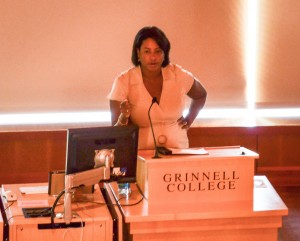In an average year, law enforcement arrests 15 million people, according to the FBI. Dawn Porter’s documentary, “Gideon’s Army,” follows several tenacious public defenders in the South charged with advocating for the not-yet-guilty in a judicial system pitted against the defendants. Porter takes a hands-off approach to the film, with award-winning editing that cuts court tapes and raw footage into a gritty view of the system. Public defenders take pride in small victories, like reduced sentences in a system where 95 percent of defendants enter a plea to avoid prison. The pressures on public defenders are intense. Porter said a young civil attorney devotes their attention to mainly four cases at a time in private practice, but the public defenders in her film work on as many as 120 felony cases at a time. This translates to an average of seven minutes of time spent on a client per day. The S&B’s Sam Hildebrandt sat down with Porter to ask her about the film and the criminal justice system.
Did you go into the making of this film knowing you were going to portray public defenders only?
No, I was about to say yes, but it’s been so long … it’s been about four years, so I knew that I was going to profile either this program or some individual people. I always expected that I would have interviews with judges and interviews with prosecutors, and then the prosecutors wouldn’t do it. So I thought, alright, “I’d rather hear from them, but if I can’t hear from them directly, I don’t want to put words in any prosecutor’s mouth.”
So then I had to shift, and I had to tell the story primarily through the defenders. That actually ended up being beneficial, because then I thought, “I think it can be a really intimate film if you’re closer with the defenders.” You’re just in their world. It’s not news report. It’s not a fair and balanced news report. [The film] is about what life is like through their eyes. I don’t know if it’s better, but it ended up being good.
What do you think are the asymmetries in the adversarial system of criminal justice that exist because there is a public defender on one side and a prosecutor who seems much better equipped on another?
When you think about the resources of a public defender office, many—I think all the ones I visited in the South—don’t have extensive law libraries and they sometimes share a Lexus Nexus password, a legal research password. They’re sharing investigators. How do you decide? If you each have 200 cases, which one gets investigated? Which person draws the lucky stick, that they get investigated? On the flip side, who’s the investigator for the prosecutor? It’s the police! They have a whole police department. A case does not get to a prosecutor. A prosecutor doesn’t decide to bring a case out of whole cloth. A prosecutor’s case is worked up by a [police department] and presented to them with all the facts taken together. It’s a prosecutor’s job to look at all those facts, which have already been collected for them and decide whether there’s enough to meet the legal standards.
Do you think there’s a financial factor in all this, even within just the justice system without the system of corrections?
Other than corruption, it’s hard to say there’s a financial incentive for locking people up. There’s clearly a profit motive for private prisons and all the collateral services: food, security guards; there are whole towns that are dependent on prisons. There are private prison corporations and you can read their prospectus. Someone recently made public the prospectus documents for a private prison company and their risk factor—their profit risk factor was decreasing prison populations. Some of these companies will require the city contracting with them to guarantee a certain level of prison incarceration or they won’t do the contract. To that extent there is clearly a financial motive. Maybe there’s a financial motive for the city that’s dependent on these companies to run their prison operations?
Do you think there’s a relationship to other justice systems where one sees such huge conviction rates [95 percent plea guilty], or do you see pleading guilty in a different way?
Eric Holder [Attorney General of the U.S.] said something really interesting to me. He said, “If we had a system that was operating the way it’s supposed to, then we should have very high conviction rates, because we should only bring good cases where we know that the person is guilty.” We shouldn’t bring these cases where there’s sketchy evidence, and we’re kind of counting on the person to plead guilty. Because we assume, that if they didn’t do “this,” then they did something else. [That] happens a lot in America. We assume, well, maybe that kid didn’t rob that old lady, but he did something else. That’s a law enforcement strategy that’s happening a lot. I’m not an expert on other systems, but I do know that we have more people incarcerated in this country—about a million more people than China. The next country down is Iran. We’re clearly incarcerating people at a far higher rate, and I can’t believe there [are] more Americans committing crimes than in the rest of the world combined.





























































